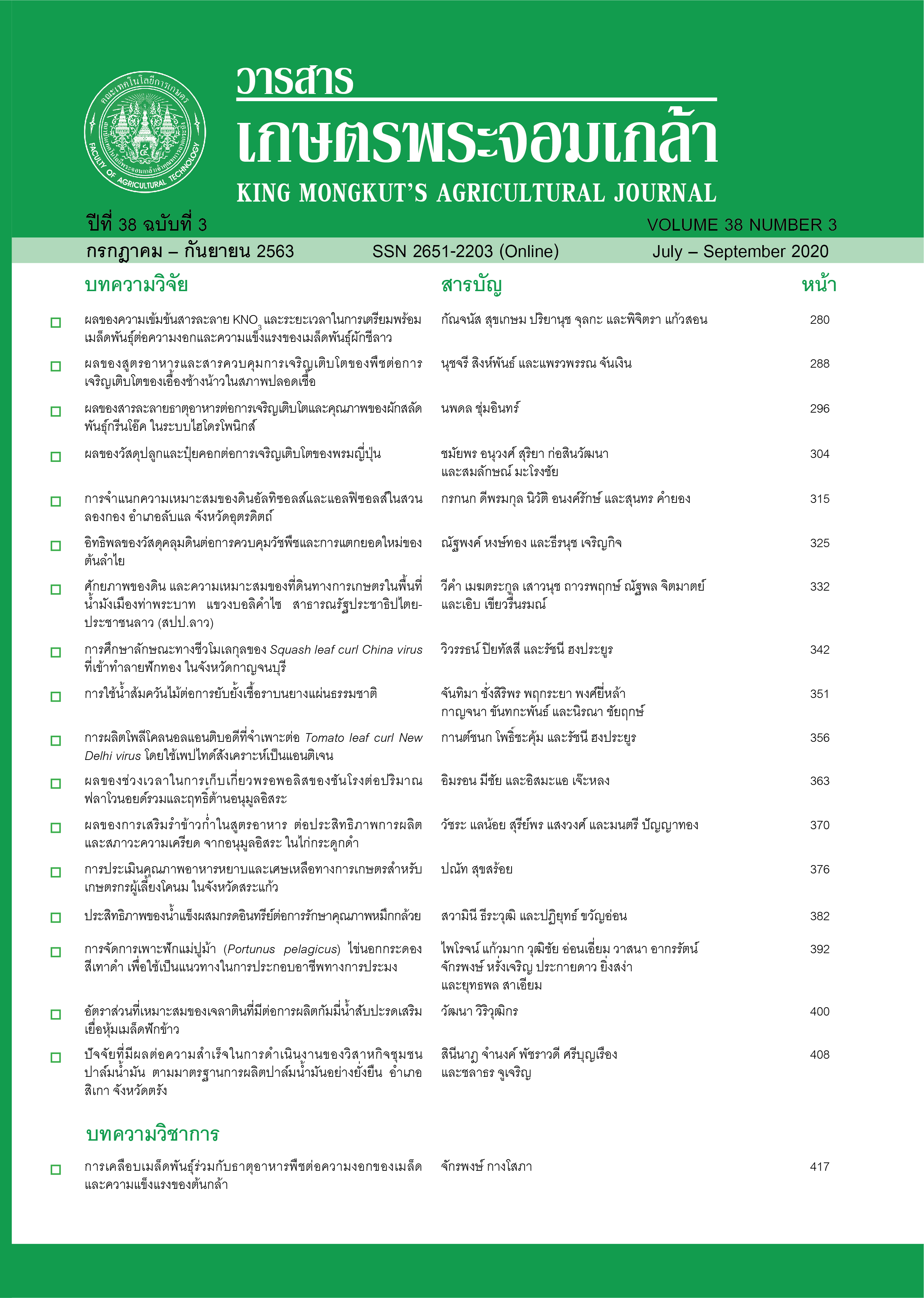ผลของความเข้มข้นสารละลาย KNO3 และระยะเวลาในการเตรียมพร้อมเมล็ดพันธุ์ต่อความงอกและความแข็งแรงของเมล็ดพันธุ์ผักชีลาว
Main Article Content
บทคัดย่อ
เมล็ดพันธุ์ผักชีลาวมักพบปัญหาความงอกต่ำ งอกช้า และไม่สม่ำเสมอ ดังนั้นวัตถุประสงค์ของงานวิจัยเพื่อศึกษา
ผลของความเข้มข้นสารละลาย KNO3 และระยะเวลาในการเตรียมพร้อมเมล็ดพันธุ์ต่อความงอกและความแข็งแรงของเมล็ดพันธุ์ผักชีลาว วางแผนการทดลองแบบ 3×2 factorial in completely randomized design (CRD) โดยเมล็ดที่ไม่เตรียมพร้อม
เมล็ดพันธุ์ (control) เป็นวิธีควบคุม มี 2 ปัจจัย ได้แก่ ปัจจัย A คือ ความเข้มข้นของสารละลาย KNO3มี 3 ระดับ คือ 0
(น้ำ reverse osmosis, RO), 250 และ 500 mg/L และปัจจัย B คือ ระยะเวลาในการแช่เมล็ด มี 2 ระดับ คือ 12 และ 24 ชั่วโมง บันทึกข้อมูลที่ 21 วันหลังทดสอบ ได้แก่ เปอร์เซ็นต์ความงอก จำนวนวันที่เมล็ดมีรากงอก (DTE) และเวลาเฉลี่ยในการงอก (MGT) ผลการทดลอง พบว่าการเตรียมพร้อมเมล็ดพันธุ์ด้วยสารละลาย KNO3 ความเข้มข้น 250 mg/L เป็นเวลา 12 ชั่วโมง
การเตรียมพร้อมเมล็ดพันธุ์ด้วยการแช่น้ำ RO เป็นเวลา 12 และ 24 ชั่วโมง ทำให้เมล็ดมีความงอกสูงที่สุด มี DTE และ MGT
เร็วที่สุดและไม่แตกต่างกันทางสถิติ ส่วนเมล็ดที่ไม่เตรียมพร้อมเมล็ดพันธุ์ (control) มีความงอกต่ำที่สุด มี DTE และ MGT ช้าที่สุด ดังนั้นการเตรียมพร้อมเมล็ดพันธุ์ด้วยสารละลาย KNO3 ความเข้มข้น 250 mg/L เป็นเวลา 12 ชั่วโมง หรือการเตรียมพร้อม
เมล็ดพันธุ์ด้วยน้ำ RO เป็นเวลา 12 หรือ 24 ชั่วโมง สามารถกระตุ้นความงอกของเมล็ดผักชีลาวได้
Article Details
วารสารเกษตรพระจอมเกล้า
เอกสารอ้างอิง
นภาพร เวชกามา, และพีระยศ แข็งขัน. 2561. การปรับปรุงคุณภาพของเมล็ดพันธุ์ด้วยเทคนิค Seed priming. วารสารเกษตรพระวรุณ 15(1): 17-30.
บุญมี ศิริ. 2558. การปรับปรุงสภาพและยกระดับคุณภาพเมล็ดพันธุ์. พิมพ์ครั้งที่ 1. ขอนแก่น: โรงพิมพ์คลังนานาวิทยา.
ภาณุมาศ ฤทธิไชย, และอติพร พิพัฒน์กรสกุล. 2551. ผลของวิธี hydropriming ต่อความงอกและความแข็งแรงของเมล็ดพันธุ์ผักชี. แก่นเกษตร 36: 235-240.
วันชัย จันทร์ประเสริฐ. 2553. สรีรวิทยาเมล็ดพันธุ์. กรุงเทพฯ: โรงพิมพ์สำนักส่งเสริมและฝึกอบรม, มหาวิทยาลัยเกษตรศาสตร์.
อุไร จิรมงคลการ. 2547. ผักพื้นบ้าน 2. พิมพ์ครั้งที่ 1. กรุงเทพฯ: สำนักพิมพ์บ้านและสวน.
Copeland, L. O., and M. B., McDonald. 1995. Principles of Seed Science and Technology. New York: Springer Science & Business Media.
Debbarma, A., Jyotsna, D., Meghali, B., and S., Debojit. 2018. Germination performance of chilli (Capsicum annuum L.) and coriander (Coriandrum sativum L.) as affected by seed priming treatments. Journal of Pharmacognosy and Phytochemistry 7(1): 2648-2652.
Dhillon, N. P. S. 1995. Seed priming of male sterile muskmelon (Cucumis melo L.) for low temperature germination. Seed Science and Technology 23(3): 881-884.
Ekpong, B., and S., Sukprakarn. 2008. Seed physiological maturity in dill (Anethum graveolens L.). Kasetsart Journal 42(5): 1-6.
Ellis, R. H., and E. H., Roberts. 1980. Improved equations for the prediction of seed longevity. Annals of Botany 45(1): 13-30.
Espanany, A., and S., Fallah. 2016. Seed germination of dill (Anethum graveolens L.) in response to salicylic acid and halopriming under cadmium stress. Iranian Journal of Plant Physiology 6(3): 1643-1665.
Holubowicz, R., and M., Morozowska. 2011. Effect of umbel position on dill (Anethum graveolens L.) plants growing in field stands on selected seed stalk features. Folia Horticulturae 23(2): 157-163.
Hoseini, M., Kouchebagh, B. S., and E., Jahandideh. 2013. Response of fennel to priming techniques. Annual Review & Research in Biology 3(2): 124-130.
ISTA. 2018. International Rules for Seed Testing. The International Seed Testing Association (ISTA), Switzerland: Bassersdorf.
Karimian, D. 2011. The effect of hydropriming on seedling growth in dill (Anethum graveolens L.) at laboratory conditions. Research Journal of Fisheries and Hydrobiology 6(4): 503-506.
Khoshvaghti, H., Hoseini, M., and S., Baser-Kouchehbagh. 2013. Does priming improve dill (Anethum graveolens) seed germination and yield?. International Journal of Biosciences 3(7): 126-131.
Lara, S. T., Jean Marcel, L. S., Amanda, R. C., Miroslava, R., and A. A., Amauri. 2014. Potassium nitrate priming affects the activity of nitrate reductase and antioxidant enzymes in tomato germination. Journal of Agricultural Science 6(2): 72-80.
Matthews, S., and K. K., Hosseini. 2006. Mean germination time as an indicator of emergence performance in soil of seed lots of maize (Zea mays). Seed Science and Technology 34(2): 339-347.
McDonald, M. B. 2000. Seed Technology and its Biological Basis. England: Sheffield Academic Press.
Tahaei, A., Soleymani, A., and M., Shams. 2016. Seed germination of medicinal plant, fennel (Foeniculum vulgare Mill), as affected by different priming techniques. Applied Biochemistry and Biotechnology 180: 26-40.


